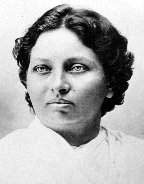PANDITA RAMABAI
(1858 - 1920)
 In appreciation of the work of Pandita Ramabai for the advancement of Indian women, the government of India approved the issuance of a commemorative stamp of Pandita Ramabai in 1989 and later named her Woman of the Millennium. The following is taken from the official brochure of the stamp from the Department of Post India:
In appreciation of the work of Pandita Ramabai for the advancement of Indian women, the government of India approved the issuance of a commemorative stamp of Pandita Ramabai in 1989 and later named her Woman of the Millennium. The following is taken from the official brochure of the stamp from the Department of Post India:
Pandita Ramabai, the youngest daughter of Anant Shastri, was a social reformer, a champion for the emancipation of women, a pioneer in education. Left totally alone by the time she was 23, Ramabai acquired a great reputation as a Sanskrit scholar before meeting the Lord Jesus Christ as her personal Savior and Lord.
Deeply impressed by her prowess, the Sanskrit scholars of Calcutta University conferred on her the titles of "Sarawati" and "Pandita." She rebelled against the caste system and married a shudra advocate, but was widowed at 23, having a baby girl. In 1882, she established the Arya Mahila Samaj for the cause of women's education in Pune and different parts of Western India. This led to the formation of the Sharada Sadan in 1889 - which school completes a hundred years this year - a school which blossomed into an umbrella organization called Pandita Ramabai Mukti Mission, 40 miles outside Pune.
In 1896, during a sever famine Ramabai toured the villages of Maharashtra with a caravan of bullock carts and rescued thousands of outcast children, child widows, orphans, and other destitute women and brought them to the shelter of Mukti and Sharada Sadan. A learned woman knowing seven languages, she also translated the Bible into her mother tongue - Marathi - from the original Hebrew and Greek. Her work continues today, a memorial to her life and path.

